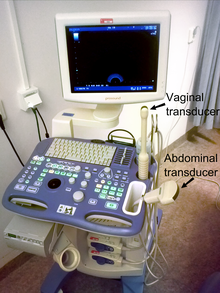
Vaginal ultrasonography is a medical ultrasonography that applies an ultrasound transducer (or "probe") in the vagina to visualize organs within the pelvic cavity. It is also called transvaginal ultrasonography because the ultrasound waves go across the vaginal wall to study tissues beyond it.
Uses
Further information: gynecologic ultrasonography and obstetric ultrasonography
Vaginal ultrasonography is used both as a means of gynecologic ultrasonography and obstetric ultrasonography. It is preferred over abdominal ultrasonography in the diagnosis of ectopic pregnancy. It also can be used to evaluate patients with post-menopausal bleeding. The finding on transvaginal ultrasound of a thin endometrial lining gives the physician a 99% negative predictive value that the patient does not have endometrial cancer. If a patient had a prior endometrial sampling that was inconclusive, then a transvaginal ultrasound can be used to triage a woman with post-menopausal bleeding.
See also
References
- Kumari, Sah Reena; Pritha, Basnet; Tara, Manandhar; Yadav, Prakash Chand; Shah, Sujeet Kumar (2022-05-31). "Comparison of Transvaginal Ultrasonography and Hysteroscopy for Evaluation of Postmenopausal Bleeding: A Cross Sectional Study". Zenodo. doi:10.5281/zenodo.6600349.
- Kirk, E.; Bottomley, C.; Bourne, T. (2013). "Diagnosing ectopic pregnancy and current concepts in the management of pregnancy of unknown location". Human Reproduction Update. 20 (2): 250–61. doi:10.1093/humupd/dmt047. PMID 24101604.
- ^ "The Role of Transvaginal Ultrasonography in Evaluating the Endometrium of Women With Postmenopausal Bleeding". www.acog.org. Retrieved 2023-10-12.
External links
 Media related to Vaginal ultrasonography at Wikimedia Commons
Media related to Vaginal ultrasonography at Wikimedia Commons
This gynaecology article is a stub. You can help Misplaced Pages by expanding it. |
This article related to medical imaging is a stub. You can help Misplaced Pages by expanding it. |